Letter of Aurelio to the assembly USA 2014
IESUS CARITAS, FRATERNITY OF PRIEST UNITED STATES
LETTER TO THE BROTHERS IN ASSEMBLY COLORADO SPRINGS 2014
Dear brothers of United States, peace and good in the Lord Jesus.
 I join everyone in this Assembly time to reflect, pray and renew the service to the fraternity in the person of the national responsible. Thanks, Mark, because in these six years you’ve helped keep alive of the fraternity with the Council, and from November 2012 flame forms part of the international team, chosen by me. We will continue working as a team to serve as our forces and possibilities; we have even more than four years, and know that this does not support retirement.
I join everyone in this Assembly time to reflect, pray and renew the service to the fraternity in the person of the national responsible. Thanks, Mark, because in these six years you’ve helped keep alive of the fraternity with the Council, and from November 2012 flame forms part of the international team, chosen by me. We will continue working as a team to serve as our forces and possibilities; we have even more than four years, and know that this does not support retirement.
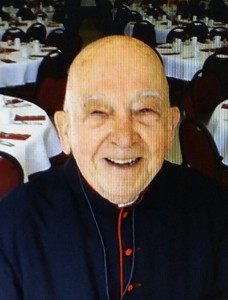 I also join with my condolences to the American fraternity for the death of Mgr Desmond DILLON, brother loved for you and that it is safe to be in the arms of the father and talking with the brother Charles about the human and divine. That these older brothers that are leaving will are seed and good land for the Church and for the fraternity. Is a great human wealth for our fraternities older brothers; their experience of life, spirituality and delivery are invaluable. Of them we must learn humility and the wisdom of a breed of pastors.
I also join with my condolences to the American fraternity for the death of Mgr Desmond DILLON, brother loved for you and that it is safe to be in the arms of the father and talking with the brother Charles about the human and divine. That these older brothers that are leaving will are seed and good land for the Church and for the fraternity. Is a great human wealth for our fraternities older brothers; their experience of life, spirituality and delivery are invaluable. Of them we must learn humility and the wisdom of a breed of pastors.
I have read very carefully the newsletter, and the themes of reflection for the Assembly of Colorado Springs. I think that it is very important to the work of preparation as personal 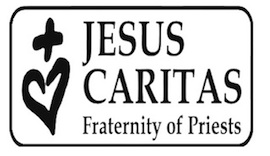 reflection and in the fraternity. We must share it the responsibility among all putting each the best of itself, and a group working together makes it possible for good results. It is true that in the fraternity we must not search make beautiful reflections or perfect work. Nobody is going to evaluate us: we evaluate ourselves in the preparation of the review of life and in the development of the same fraternal meeting. So it is much more important even the time of adoration, put before Jesus with humility, peace and realism, how we are, what we want, what we expect, how trust in Jesus, how we put ourselves in the hands of the Father making the Prayer of Abandonment an attitude that lasts throughout the day: when we work, when we deal with people, when we celebrate the Eucharist. In the brother Charles de FOUCAULD, we have that attitude for years, in your dreams and realities.
reflection and in the fraternity. We must share it the responsibility among all putting each the best of itself, and a group working together makes it possible for good results. It is true that in the fraternity we must not search make beautiful reflections or perfect work. Nobody is going to evaluate us: we evaluate ourselves in the preparation of the review of life and in the development of the same fraternal meeting. So it is much more important even the time of adoration, put before Jesus with humility, peace and realism, how we are, what we want, what we expect, how trust in Jesus, how we put ourselves in the hands of the Father making the Prayer of Abandonment an attitude that lasts throughout the day: when we work, when we deal with people, when we celebrate the Eucharist. In the brother Charles de FOUCAULD, we have that attitude for years, in your dreams and realities.
I encourage you “to dream the fraternity”, as says our brother Mariano PUGA. To dream the fraternity is not living of illusions or do an episode of the science fiction of our 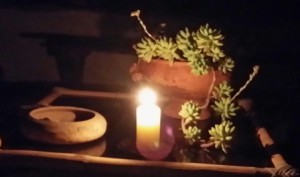 membership to the fraternity. Many brother priests of our Diocese, need our support, our time and attention. Each of us also need all that. Our spiritual path is linked to the moment that we live as human beings. To dream of the fraternity is to go beyond a spirituality that helps us to live the Gospel, prayer, every day become believers in Jesus and believers in a humanity which in some countries are bled, destroys itself, and always the poor who suffer the consequences. For this reason the fraternity is not a spiritual group, but a small community of brothers who care for others and feel the pain and joy of humanity as Jesus felt them, without staying with arms crossed waiting to be others who solve the problems.
membership to the fraternity. Many brother priests of our Diocese, need our support, our time and attention. Each of us also need all that. Our spiritual path is linked to the moment that we live as human beings. To dream of the fraternity is to go beyond a spirituality that helps us to live the Gospel, prayer, every day become believers in Jesus and believers in a humanity which in some countries are bled, destroys itself, and always the poor who suffer the consequences. For this reason the fraternity is not a spiritual group, but a small community of brothers who care for others and feel the pain and joy of humanity as Jesus felt them, without staying with arms crossed waiting to be others who solve the problems.
The Church we need as we need the Church to walk with Jesus and build the Kingdom. I wish you in this Assembly of Colorado Springs live with realism and in a climate of prayer as men of God the challenges of your fraternity. In 2015 celebrate, if it’s the Lord’s will, the I Panamerican Assembly. We go making way.
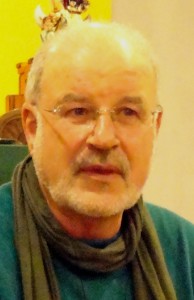 Receive a big hug and my support in prayer.
Receive a big hug and my support in prayer.
Aurelio SANZ BAEZA, brother responsible
Perín, Cartagena, Murcia, Spain, 25 July 2014,
solemnity of St James Apostle
Sorry my English… Oh, my God, forgive me…
Letter to the brothers in the month of Nazareth in Ireland and benefactors
To the Irish brothers gathered for the month of Nazareth and all our benefactors.
We are 24 priests of the Fraternity Jesus Caritas collected for the month of Nazareth in Kribi, Cameroon.
We come from different African countries: Burkina Faso, Cameroon, Central African Republic, Madagascar, Chad, France.
This is for all of us a strong time of fellowship, prayer and exchange about our respective ministry and our life according to the intuition of Nazareth.
To live this gathering, many of us have experienced the difficulty of crossing borders (Central African Republic, Madagascar …) which caused some delays.
But now we are all full. And it is a great joy for us! We thank the Lord for having given us to come together as well.
After a first week full replay of life, we had a great week of retreat preached by Bishop Philip Stevens, Bishop Emeritus of Maroua-Mokolo (Cameroon) and Little Brothers of the Gospel. We are entering a week of discovery or deepening Message of Charles de Foucauld led by Jean-François Berjonneau.
We measure how the charisma of Brother Charles as “universal brother” is very relevant in the context of globalization and uncertainty about the future for many countries.
That is why we feel the desire to come and join you, who also made this experience of the month of Nazareth in Ireland.
We are all united in the passion of Brother Charles for his Beloved Lord Jesus Christ who has called us to shout the Gospel through our whole life for every human person, especially the poor and marginalized, so trey shall be recognized as brothers and sisters beloved.
We believe that we have fellowship with one another in this common desire, which holds us together, to deepen the spiritual message of Brother Charles.
And we thank deeply all those who have contributed by their fraternal solidarity and support for the realization of this month of Nazareth who fills us with joy and gives us a new impetus to the mission. Thank you to continue to lead us in prayer as we do for you. According to the Cameroonian beautiful phrase, “We are together!“…
P. Grégoire CADOR
Parish St Joseph of Tokombéré, Cameroon
(Français) Lettre aux frères du Maghreb, Juillet 2014
RETREAT IN ENGLAND, JUNE 2014
RETREAT JESUS CARITAS FRATERNITY OF PRIESTS IN ENGLAND
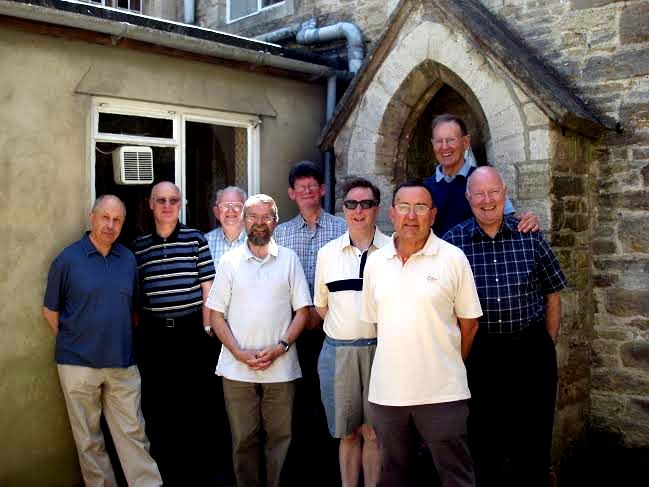
REPORT
RETREAT IN NYMPSFIELD, ENGLAND
JUNE 23RD – 27TH 2014
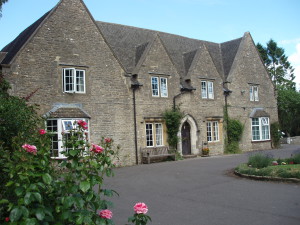 ‘EXPECT A MIRACLE!’ was the message that greeted us from the wall of the reception room as we arrived to begin our retreat – and it soon appeared that we might need one! Three of our members had had to cancel through last minute illnesses and one of them was Jim Murphy, our intended retreat leader who found himself in hospital after collapsing just two days before we were due to begin.
‘EXPECT A MIRACLE!’ was the message that greeted us from the wall of the reception room as we arrived to begin our retreat – and it soon appeared that we might need one! Three of our members had had to cancel through last minute illnesses and one of them was Jim Murphy, our intended retreat leader who found himself in hospital after collapsing just two days before we were due to begin.
Well, as one wise old brother used to repeat: ‘EVERYTHING IS IN THE FRATERNITY’ – we still had one another, and it proved to be enough. Without any fuss the remaining nine of us finished our cups of tea and got into our usual routine of praying the office, adoration, celebrating the eucharist along with the Sisters and finding inspiration for the review of life in some past conferences of Tony Philpot and the recently transla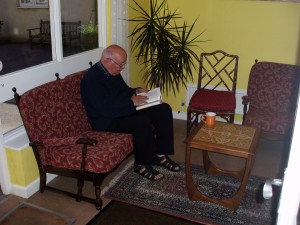 ted biography of Brother Charles (‘Journey to Tamanrasset’ by Antoine Chatelard). The atmosphere of friendship and peace was very tangible and was picked up at one of the masses by Adrian spontaneously quoting: ‘How good and how pleasant it is when brothers dwell in unity’. The Lord blessed us in other ways too: the Marist Sisters looked after us like family and the sun shone steadily upon us in a most un-british way.
ted biography of Brother Charles (‘Journey to Tamanrasset’ by Antoine Chatelard). The atmosphere of friendship and peace was very tangible and was picked up at one of the masses by Adrian spontaneously quoting: ‘How good and how pleasant it is when brothers dwell in unity’. The Lord blessed us in other ways too: the Marist Sisters looked after us like family and the sun shone steadily upon us in a most un-british way.
p.s. Glad to report that Jim and the other brothers have made a good recovery.
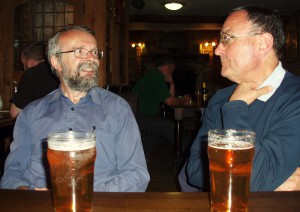
(Español) Carta para la III Semana de Nazaret, Chile 2014
(Français) Lettre d’Aurelio au Mois de Nazareth Cameroun 2014
Letter Month of Nazareth Ireland 2014
Dear brothers,
from Spain, before to go to Morocco next Monday for to be with our Maghrebian brothers in Rabat, those of Tunis, Algeria and Morocco, I want to communicate to you my communion with you in your Month of Nazareth.
Nazareth, time for live, time for pray, time for work to one better World, the Kingdom that Jesus continues dreaming across us themselves and our effort. Nazareth: way of life having like neighbor and contemporary to Jesus. Time for to open our interior to the brothers.
I wish you of heart to live this month as a God’s gift and an exclusive time of fraternity. Many brothers in the world will be praying for you, pray also for us.
And in Cameroon, in July, also there will be the brothers of several countries of Africa in his Month of Nazareth. I suggest you in some moment to have a communication with them. Someone me it can send to me and I will communicate it. If it is possible, in French. Thank you!
I hope a report to publish in our site iesuscaritas.org on having finished the Month.
God blesses you. That the brother Charles covers also between you!
Have a fraternal embrace to each one, and sorry my “spanglish”.
Aurelio, brother responsible
Perín, Cartagena, Murcia, Spain, 26 June 2014


